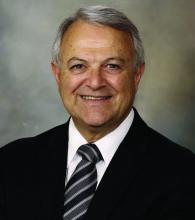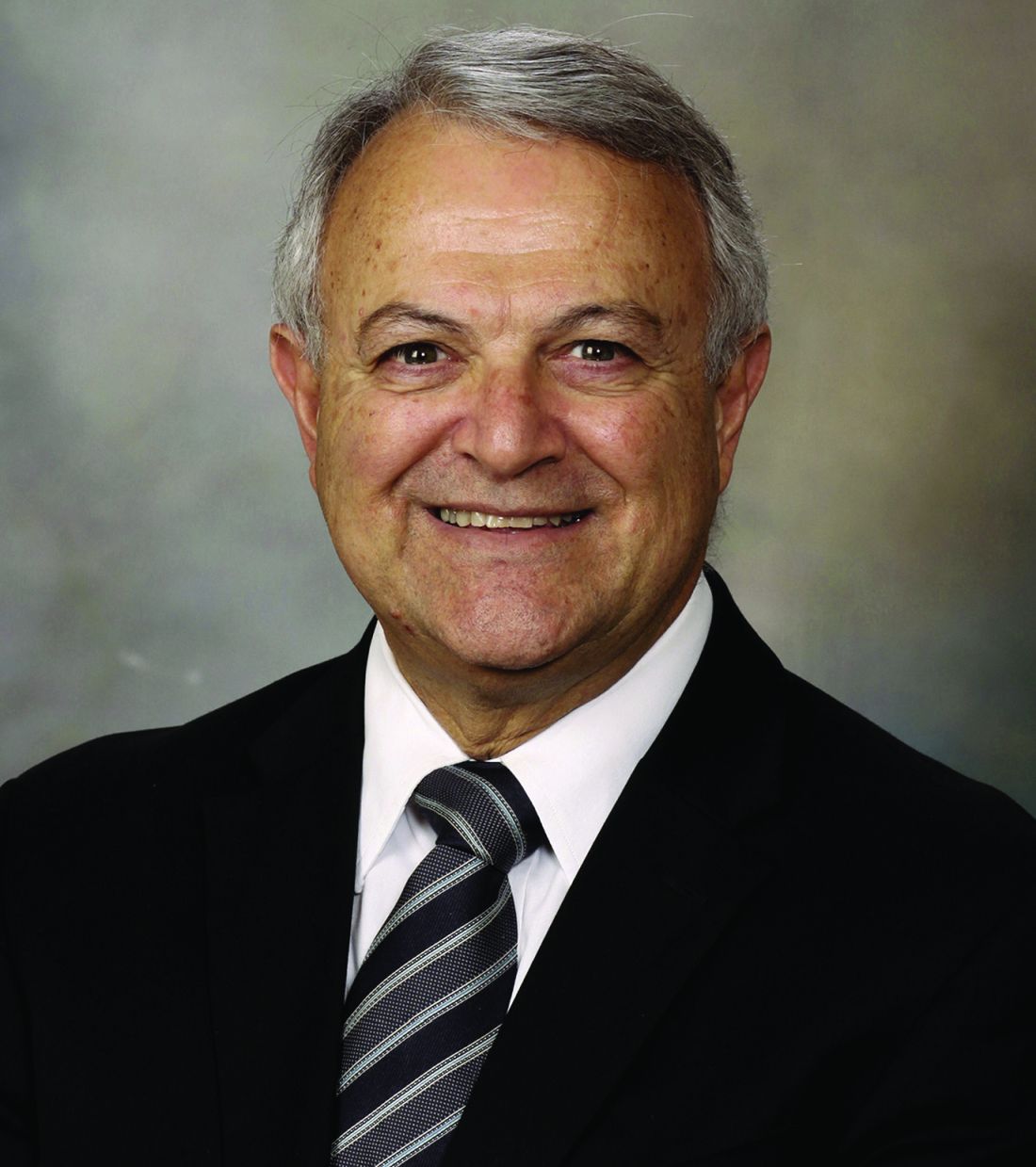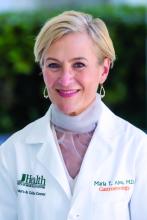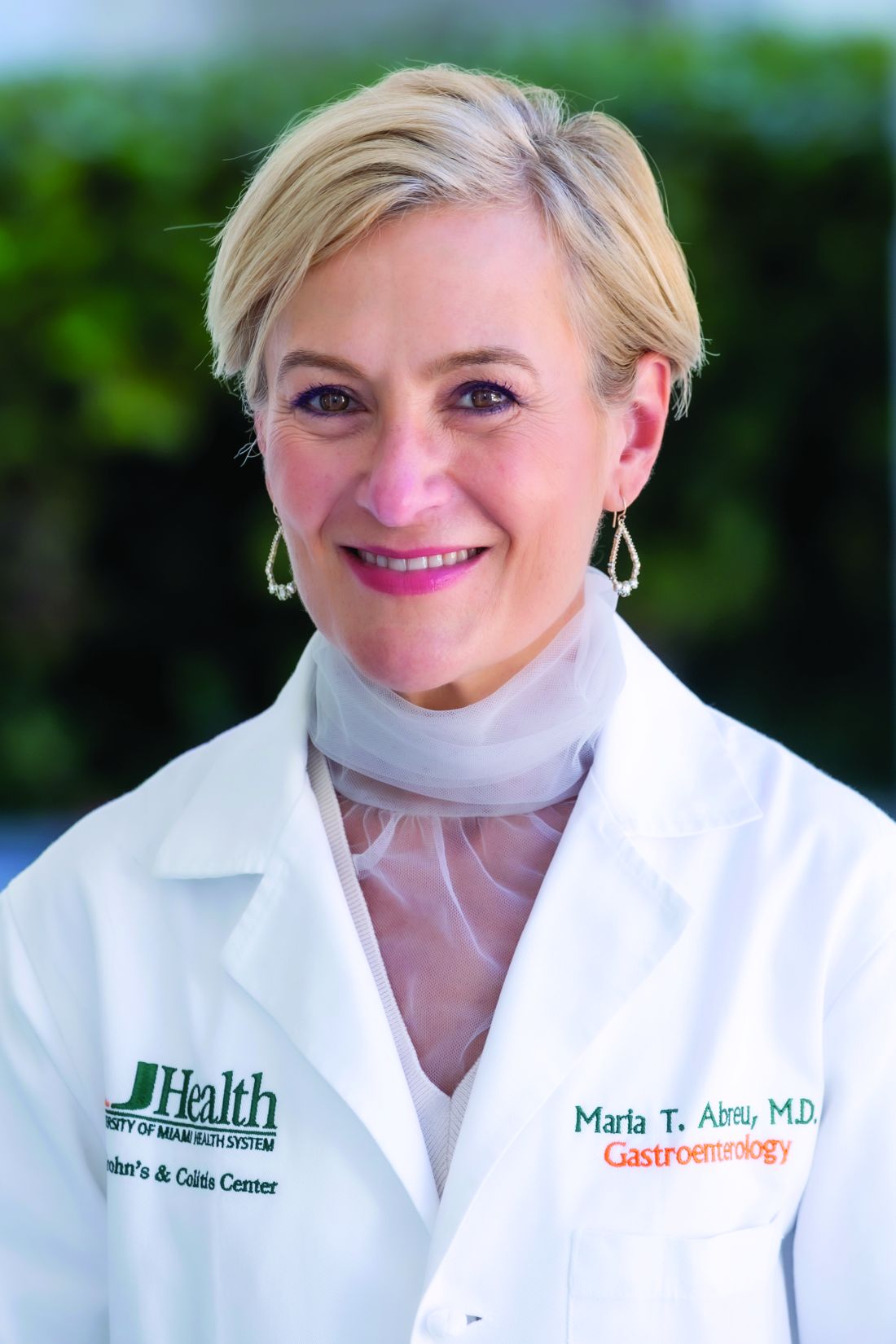User login
AGA Research Foundation: You Can Help
To my fellow AGA Members, I’m not the first to tell you that real progress in the diagnosis, treatment, and cure of digestive disease is at risk. Research funding from traditional sources, like the National Institutes of Health, continues to shrink. We can expect even greater cuts on the horizon.
GI investigators in the early stages of their careers are particularly hard hit. They are finding it much more difficult to secure needed federal funding. As a result, many of these investigators are walking away from GI research frustrated by a lack of support.
It is our hope that physicians have an abundance of new tools and treatments to care for their patients suffering from digestive disorders.
You know that research has revolutionized the care of many digestive disease patients. These patients, as well as everyone in the GI field clinicians and researchers alike, have benefited from the discoveries of passionate investigators, past and present.
This is where you can help.
New treatments and devices are the result of years of research. The AGA Research Foundation grants are critical to continuing the GI pipeline.
Help us fund more researchers by supporting the AGA Research Foundation with a year-end donation. Your donation will support young investigators’ research careers and help assure research is continued.
Be gracious, generous and giving to the future of the GI specialty this holiday season. There are three easy ways to give:
Make a tax-deductible donation online at www. foundation.gastro.org.
Send a donation through the mail to:
AGA Research Foundation
4930 Del Ray Avenue
Bethesda, MD 20814
Or donate over the phone by calling (301) 222-4002. All gifts are tax-deductible to the fullest extent of US law. Join us!
Dr. Camilleri is AGA Research Foundation Chair and Past AGA Institute President. He is a consultant in the Division of Gastroenterology and Hepatology, Mayo Clinic, Rochester, Minnesota.
To my fellow AGA Members, I’m not the first to tell you that real progress in the diagnosis, treatment, and cure of digestive disease is at risk. Research funding from traditional sources, like the National Institutes of Health, continues to shrink. We can expect even greater cuts on the horizon.
GI investigators in the early stages of their careers are particularly hard hit. They are finding it much more difficult to secure needed federal funding. As a result, many of these investigators are walking away from GI research frustrated by a lack of support.
It is our hope that physicians have an abundance of new tools and treatments to care for their patients suffering from digestive disorders.
You know that research has revolutionized the care of many digestive disease patients. These patients, as well as everyone in the GI field clinicians and researchers alike, have benefited from the discoveries of passionate investigators, past and present.
This is where you can help.
New treatments and devices are the result of years of research. The AGA Research Foundation grants are critical to continuing the GI pipeline.
Help us fund more researchers by supporting the AGA Research Foundation with a year-end donation. Your donation will support young investigators’ research careers and help assure research is continued.
Be gracious, generous and giving to the future of the GI specialty this holiday season. There are three easy ways to give:
Make a tax-deductible donation online at www. foundation.gastro.org.
Send a donation through the mail to:
AGA Research Foundation
4930 Del Ray Avenue
Bethesda, MD 20814
Or donate over the phone by calling (301) 222-4002. All gifts are tax-deductible to the fullest extent of US law. Join us!
Dr. Camilleri is AGA Research Foundation Chair and Past AGA Institute President. He is a consultant in the Division of Gastroenterology and Hepatology, Mayo Clinic, Rochester, Minnesota.
To my fellow AGA Members, I’m not the first to tell you that real progress in the diagnosis, treatment, and cure of digestive disease is at risk. Research funding from traditional sources, like the National Institutes of Health, continues to shrink. We can expect even greater cuts on the horizon.
GI investigators in the early stages of their careers are particularly hard hit. They are finding it much more difficult to secure needed federal funding. As a result, many of these investigators are walking away from GI research frustrated by a lack of support.
It is our hope that physicians have an abundance of new tools and treatments to care for their patients suffering from digestive disorders.
You know that research has revolutionized the care of many digestive disease patients. These patients, as well as everyone in the GI field clinicians and researchers alike, have benefited from the discoveries of passionate investigators, past and present.
This is where you can help.
New treatments and devices are the result of years of research. The AGA Research Foundation grants are critical to continuing the GI pipeline.
Help us fund more researchers by supporting the AGA Research Foundation with a year-end donation. Your donation will support young investigators’ research careers and help assure research is continued.
Be gracious, generous and giving to the future of the GI specialty this holiday season. There are three easy ways to give:
Make a tax-deductible donation online at www. foundation.gastro.org.
Send a donation through the mail to:
AGA Research Foundation
4930 Del Ray Avenue
Bethesda, MD 20814
Or donate over the phone by calling (301) 222-4002. All gifts are tax-deductible to the fullest extent of US law. Join us!
Dr. Camilleri is AGA Research Foundation Chair and Past AGA Institute President. He is a consultant in the Division of Gastroenterology and Hepatology, Mayo Clinic, Rochester, Minnesota.
Unlock the Latest Clinical Updates with the 2024 PG Course OnDemand
Did you miss out on the AGA Postgraduate Course this year?
Visit agau.gastro.org to purchase today for flexible, on-the-go access to the latest clinical advances in the GI field.
- Unparalleled access: Choose when and where you dive into content with convenient access from any computer or mobile device.
- Incredible faculty: Learn from renowned experts who will offer their perspectives on cutting-edge research and clinical guidance.
- Tangible strategies: Expert and early career faculty will guide you through challenging patient cases and provide strategies you can easily implement upon your return to the office.
- Efficient learning: Content is organized by category: GI oncology, neurogastroenterology & motility, obesity, advanced endoscopy, and liver.
- Continuing education: With CME testing integrated directly into each session, you can easily earn up to 16 CME and MOC credits through December 31, 2024.
Did you miss out on the AGA Postgraduate Course this year?
Visit agau.gastro.org to purchase today for flexible, on-the-go access to the latest clinical advances in the GI field.
- Unparalleled access: Choose when and where you dive into content with convenient access from any computer or mobile device.
- Incredible faculty: Learn from renowned experts who will offer their perspectives on cutting-edge research and clinical guidance.
- Tangible strategies: Expert and early career faculty will guide you through challenging patient cases and provide strategies you can easily implement upon your return to the office.
- Efficient learning: Content is organized by category: GI oncology, neurogastroenterology & motility, obesity, advanced endoscopy, and liver.
- Continuing education: With CME testing integrated directly into each session, you can easily earn up to 16 CME and MOC credits through December 31, 2024.
Did you miss out on the AGA Postgraduate Course this year?
Visit agau.gastro.org to purchase today for flexible, on-the-go access to the latest clinical advances in the GI field.
- Unparalleled access: Choose when and where you dive into content with convenient access from any computer or mobile device.
- Incredible faculty: Learn from renowned experts who will offer their perspectives on cutting-edge research and clinical guidance.
- Tangible strategies: Expert and early career faculty will guide you through challenging patient cases and provide strategies you can easily implement upon your return to the office.
- Efficient learning: Content is organized by category: GI oncology, neurogastroenterology & motility, obesity, advanced endoscopy, and liver.
- Continuing education: With CME testing integrated directly into each session, you can easily earn up to 16 CME and MOC credits through December 31, 2024.
Our Biggest Turnout Ever for Advocacy Day!
That’s why we gathered our leaders from across the United States in Washington, DC, to meet with congressional offices during our annual Advocacy Day.
GIs from California to Massachusetts and many states in between met with House and Senate offices to educate members of Congress and their staff about the most critical policy issues impacting you and your patients. In total, 28 states were represented and we attended more than 100 meetings in 64 different districts, which was a mix of both Republican and Democratic offices.
For the second year in a row, we were fortunate to be joined by GI patient advocates as well, who shared personal stories about the challenges they encountered in the health care system, and the negative effects to their well-being and quality of life because of red tape caused by prior authorization and step therapy.
The in-person advocacy of our members and patient advocates makes a difference. In one of AGA President Dr. Maria Abreu’s meetings, the congressional staffer remembered that he met with her, Dr. Mel Wilcox, and a patient advocate during 2023’s Advocacy Day and recounted the impact of their conversation about delays to timely access to care for inflammatory bowel disease medication.
Numerous GIs had similar experiences on Advocacy Day and recounted the benefits of being able to walk into House and Senate offices and educate congressional staff on the issues they’re experiencing in their clinic or lab.
Being able to start these conversations about health care and GI and build these relationships showcases the value of Advocacy Day, and demonstrates how AGA works with members to make it easy to advocate for the issues important to them. We were able to have a full day of constructive meetings with lawmakers and their staff thanks to members and patient advocates. Thank you for being engaged and using your voices to protect GI patient care!
That’s why we gathered our leaders from across the United States in Washington, DC, to meet with congressional offices during our annual Advocacy Day.
GIs from California to Massachusetts and many states in between met with House and Senate offices to educate members of Congress and their staff about the most critical policy issues impacting you and your patients. In total, 28 states were represented and we attended more than 100 meetings in 64 different districts, which was a mix of both Republican and Democratic offices.
For the second year in a row, we were fortunate to be joined by GI patient advocates as well, who shared personal stories about the challenges they encountered in the health care system, and the negative effects to their well-being and quality of life because of red tape caused by prior authorization and step therapy.
The in-person advocacy of our members and patient advocates makes a difference. In one of AGA President Dr. Maria Abreu’s meetings, the congressional staffer remembered that he met with her, Dr. Mel Wilcox, and a patient advocate during 2023’s Advocacy Day and recounted the impact of their conversation about delays to timely access to care for inflammatory bowel disease medication.
Numerous GIs had similar experiences on Advocacy Day and recounted the benefits of being able to walk into House and Senate offices and educate congressional staff on the issues they’re experiencing in their clinic or lab.
Being able to start these conversations about health care and GI and build these relationships showcases the value of Advocacy Day, and demonstrates how AGA works with members to make it easy to advocate for the issues important to them. We were able to have a full day of constructive meetings with lawmakers and their staff thanks to members and patient advocates. Thank you for being engaged and using your voices to protect GI patient care!
That’s why we gathered our leaders from across the United States in Washington, DC, to meet with congressional offices during our annual Advocacy Day.
GIs from California to Massachusetts and many states in between met with House and Senate offices to educate members of Congress and their staff about the most critical policy issues impacting you and your patients. In total, 28 states were represented and we attended more than 100 meetings in 64 different districts, which was a mix of both Republican and Democratic offices.
For the second year in a row, we were fortunate to be joined by GI patient advocates as well, who shared personal stories about the challenges they encountered in the health care system, and the negative effects to their well-being and quality of life because of red tape caused by prior authorization and step therapy.
The in-person advocacy of our members and patient advocates makes a difference. In one of AGA President Dr. Maria Abreu’s meetings, the congressional staffer remembered that he met with her, Dr. Mel Wilcox, and a patient advocate during 2023’s Advocacy Day and recounted the impact of their conversation about delays to timely access to care for inflammatory bowel disease medication.
Numerous GIs had similar experiences on Advocacy Day and recounted the benefits of being able to walk into House and Senate offices and educate congressional staff on the issues they’re experiencing in their clinic or lab.
Being able to start these conversations about health care and GI and build these relationships showcases the value of Advocacy Day, and demonstrates how AGA works with members to make it easy to advocate for the issues important to them. We were able to have a full day of constructive meetings with lawmakers and their staff thanks to members and patient advocates. Thank you for being engaged and using your voices to protect GI patient care!
An Investment in the Future of GI: The AGA Research Foundation
What will the practice of gastroenterology look like in 20 years? It is our hope that physicians have an abundance of new tools and treatments to care for their patients suffering from digestive disorders.
How will we get there? New treatments and devices are the result of years of research.
To help make this dream a reality, AGA — through the AGA Research Foundation — has made a commitment to support investigators in GI and hepatology with its Research Awards Program.
These diverse researchers range from young investigators to more seasoned leaders in GI, all embarking on novel research projects that will advance our understanding of digestive conditions and pave the way for future discoveries in the field.
To our AGA Research Foundation donors, we sincerely thank you for your gifts.
We invite the GI community to join others in supporting and helping spark the scientific breakthroughs of today so clinicians will have the tools to improve care tomorrow.
Make your tax-deductible gift today at www.gastro.org/donateonline.
What will the practice of gastroenterology look like in 20 years? It is our hope that physicians have an abundance of new tools and treatments to care for their patients suffering from digestive disorders.
How will we get there? New treatments and devices are the result of years of research.
To help make this dream a reality, AGA — through the AGA Research Foundation — has made a commitment to support investigators in GI and hepatology with its Research Awards Program.
These diverse researchers range from young investigators to more seasoned leaders in GI, all embarking on novel research projects that will advance our understanding of digestive conditions and pave the way for future discoveries in the field.
To our AGA Research Foundation donors, we sincerely thank you for your gifts.
We invite the GI community to join others in supporting and helping spark the scientific breakthroughs of today so clinicians will have the tools to improve care tomorrow.
Make your tax-deductible gift today at www.gastro.org/donateonline.
What will the practice of gastroenterology look like in 20 years? It is our hope that physicians have an abundance of new tools and treatments to care for their patients suffering from digestive disorders.
How will we get there? New treatments and devices are the result of years of research.
To help make this dream a reality, AGA — through the AGA Research Foundation — has made a commitment to support investigators in GI and hepatology with its Research Awards Program.
These diverse researchers range from young investigators to more seasoned leaders in GI, all embarking on novel research projects that will advance our understanding of digestive conditions and pave the way for future discoveries in the field.
To our AGA Research Foundation donors, we sincerely thank you for your gifts.
We invite the GI community to join others in supporting and helping spark the scientific breakthroughs of today so clinicians will have the tools to improve care tomorrow.
Make your tax-deductible gift today at www.gastro.org/donateonline.
Gastro Journal Club: Proximal Cancers in FIT-Positive Patients
For our next installment of the Gastro Journal Club, They are joined by fellows from the Icahn School of Medicine at Mount Sinai in New York City for a discussion of the article “Risk of Cancers Proximal to the Colon in Fecal Immunochemical Test Positive Screenees in a Colorectal Cancer Screening Program,” published in the September 2024 issue of Gastroenterology .
Visit our YouTube Channel (youtube.com/@AmerGastroAssn) to watch the session.
The Gastro Journal Club is by and for fellows and residents. During these sessions, fellows and residents have the opportunity to ask authors questions about their recently published work in Gastroenterology. If you are interested in arranging a Gastro Journal Club session at your institution, please contact mpogachar@gastro.org.
For our next installment of the Gastro Journal Club, They are joined by fellows from the Icahn School of Medicine at Mount Sinai in New York City for a discussion of the article “Risk of Cancers Proximal to the Colon in Fecal Immunochemical Test Positive Screenees in a Colorectal Cancer Screening Program,” published in the September 2024 issue of Gastroenterology .
Visit our YouTube Channel (youtube.com/@AmerGastroAssn) to watch the session.
The Gastro Journal Club is by and for fellows and residents. During these sessions, fellows and residents have the opportunity to ask authors questions about their recently published work in Gastroenterology. If you are interested in arranging a Gastro Journal Club session at your institution, please contact mpogachar@gastro.org.
For our next installment of the Gastro Journal Club, They are joined by fellows from the Icahn School of Medicine at Mount Sinai in New York City for a discussion of the article “Risk of Cancers Proximal to the Colon in Fecal Immunochemical Test Positive Screenees in a Colorectal Cancer Screening Program,” published in the September 2024 issue of Gastroenterology .
Visit our YouTube Channel (youtube.com/@AmerGastroAssn) to watch the session.
The Gastro Journal Club is by and for fellows and residents. During these sessions, fellows and residents have the opportunity to ask authors questions about their recently published work in Gastroenterology. If you are interested in arranging a Gastro Journal Club session at your institution, please contact mpogachar@gastro.org.
2025 Crohn’s & Colitis Congress® Abstract Submissions
The 2025 Crohn’s & Colitis Congress®, a partnership of the Crohn’s & Colitis Foundation and AGA, is now accepting original inflammatory bowel disease (IBD)-research abstract submissions through Oct. 16. Abstracts are free to submit and may be selected for in-person lectures or poster presentations. Accepted abstracts will also be co-published in AGA’s Gastroenterology (https://www.gastrojournal.org/) and the Crohn’s & Colitis Foundation’s Inflammatory Bowel Diseases (https://academic.oup.com/ibdjournal).
Be sure to review the abstract submission guidelines and submit by 9 p.m. EDT, Wednesday, Oct. 16.
Presenting authors will receive notification of acceptance on Monday, Dec. 9.
The Crohn’s & Colitis Congress will take place Feb. 6-8, 2025, in San Francisco, California. It brings together the community of multidisciplinary experts and colleagues to revolutionize prevention, care and outcomes for IBD patients.
Learn alongside your colleagues and discover how to provide the absolute best care to those suffering with Crohn’s disease and ulcerative colitis.
The 2025 Crohn’s & Colitis Congress®, a partnership of the Crohn’s & Colitis Foundation and AGA, is now accepting original inflammatory bowel disease (IBD)-research abstract submissions through Oct. 16. Abstracts are free to submit and may be selected for in-person lectures or poster presentations. Accepted abstracts will also be co-published in AGA’s Gastroenterology (https://www.gastrojournal.org/) and the Crohn’s & Colitis Foundation’s Inflammatory Bowel Diseases (https://academic.oup.com/ibdjournal).
Be sure to review the abstract submission guidelines and submit by 9 p.m. EDT, Wednesday, Oct. 16.
Presenting authors will receive notification of acceptance on Monday, Dec. 9.
The Crohn’s & Colitis Congress will take place Feb. 6-8, 2025, in San Francisco, California. It brings together the community of multidisciplinary experts and colleagues to revolutionize prevention, care and outcomes for IBD patients.
Learn alongside your colleagues and discover how to provide the absolute best care to those suffering with Crohn’s disease and ulcerative colitis.
The 2025 Crohn’s & Colitis Congress®, a partnership of the Crohn’s & Colitis Foundation and AGA, is now accepting original inflammatory bowel disease (IBD)-research abstract submissions through Oct. 16. Abstracts are free to submit and may be selected for in-person lectures or poster presentations. Accepted abstracts will also be co-published in AGA’s Gastroenterology (https://www.gastrojournal.org/) and the Crohn’s & Colitis Foundation’s Inflammatory Bowel Diseases (https://academic.oup.com/ibdjournal).
Be sure to review the abstract submission guidelines and submit by 9 p.m. EDT, Wednesday, Oct. 16.
Presenting authors will receive notification of acceptance on Monday, Dec. 9.
The Crohn’s & Colitis Congress will take place Feb. 6-8, 2025, in San Francisco, California. It brings together the community of multidisciplinary experts and colleagues to revolutionize prevention, care and outcomes for IBD patients.
Learn alongside your colleagues and discover how to provide the absolute best care to those suffering with Crohn’s disease and ulcerative colitis.
Meet Our 10 Editorial Fellows
We are excited to announce the 2024-25 participants, who will gain hands-on experience and mentorship working closely with the editors and staff at the AGA journals over the next year.
The 10 editorial fellows (2 per journal) will learn about the entire editorial process, from manuscript submission to peer review to acceptance. They will participate in discussions and conferences with the boards of editors, assist with manuscript review, and help disseminate articles via their social media platforms.
Clinical Gastroenterology and Hepatology
Robyn Jordan, MD, MPH
Johns Hopkins Hospital, Baltimore | USA
Daryl Ramai, MD, MPH, MSc
Brigham and Women’s Hospital, Boston | USA
Cellular and Molecular Gastroenterology and Hepatology
Kole H. Buckley, PhD
University of Pennsylvania Perelman School of Medicine, Philadelphia | USA
Lin Y. Hung, PhD
New York University | USA
Gastroenterology
Corey J. Ketchem, MD
University of Pennsylvania, Philadelphia | USA
Rishad Khan, MD
University of Toronto | Canada
Gastro Hep Advances
Sasha Kapil, MD
UT Southwestern Medical Center, Dallas | USA
June Tome, MD
Mayo Clinic, Rochester, Minnesota | USA
Techniques and Innovations in Gastrointestinal Endoscopy
Thomas Enke, MD
University of Colorado, Aurora | USA
Sami Elamin, MD
Harvard, Beth Israel Deaconess Medical Center, Boston | USA
We are excited to announce the 2024-25 participants, who will gain hands-on experience and mentorship working closely with the editors and staff at the AGA journals over the next year.
The 10 editorial fellows (2 per journal) will learn about the entire editorial process, from manuscript submission to peer review to acceptance. They will participate in discussions and conferences with the boards of editors, assist with manuscript review, and help disseminate articles via their social media platforms.
Clinical Gastroenterology and Hepatology
Robyn Jordan, MD, MPH
Johns Hopkins Hospital, Baltimore | USA
Daryl Ramai, MD, MPH, MSc
Brigham and Women’s Hospital, Boston | USA
Cellular and Molecular Gastroenterology and Hepatology
Kole H. Buckley, PhD
University of Pennsylvania Perelman School of Medicine, Philadelphia | USA
Lin Y. Hung, PhD
New York University | USA
Gastroenterology
Corey J. Ketchem, MD
University of Pennsylvania, Philadelphia | USA
Rishad Khan, MD
University of Toronto | Canada
Gastro Hep Advances
Sasha Kapil, MD
UT Southwestern Medical Center, Dallas | USA
June Tome, MD
Mayo Clinic, Rochester, Minnesota | USA
Techniques and Innovations in Gastrointestinal Endoscopy
Thomas Enke, MD
University of Colorado, Aurora | USA
Sami Elamin, MD
Harvard, Beth Israel Deaconess Medical Center, Boston | USA
We are excited to announce the 2024-25 participants, who will gain hands-on experience and mentorship working closely with the editors and staff at the AGA journals over the next year.
The 10 editorial fellows (2 per journal) will learn about the entire editorial process, from manuscript submission to peer review to acceptance. They will participate in discussions and conferences with the boards of editors, assist with manuscript review, and help disseminate articles via their social media platforms.
Clinical Gastroenterology and Hepatology
Robyn Jordan, MD, MPH
Johns Hopkins Hospital, Baltimore | USA
Daryl Ramai, MD, MPH, MSc
Brigham and Women’s Hospital, Boston | USA
Cellular and Molecular Gastroenterology and Hepatology
Kole H. Buckley, PhD
University of Pennsylvania Perelman School of Medicine, Philadelphia | USA
Lin Y. Hung, PhD
New York University | USA
Gastroenterology
Corey J. Ketchem, MD
University of Pennsylvania, Philadelphia | USA
Rishad Khan, MD
University of Toronto | Canada
Gastro Hep Advances
Sasha Kapil, MD
UT Southwestern Medical Center, Dallas | USA
June Tome, MD
Mayo Clinic, Rochester, Minnesota | USA
Techniques and Innovations in Gastrointestinal Endoscopy
Thomas Enke, MD
University of Colorado, Aurora | USA
Sami Elamin, MD
Harvard, Beth Israel Deaconess Medical Center, Boston | USA
Creating a Planned Gift That’s Meaningful To You
The AGA Research Foundation has helped make significant strides in advancing the treatment and cure of digestive diseases by funding talented investigators.
Planning your gift to benefit AGA Research Foundation in the future is an opportunity to express what matters to you. As an AGA member, you can work with the AGA Research Foundation to ensure that your planned gift is designated for a purpose that meets your goals for leaving a legacy—such as research awards, support for specific programs, or unrestricted gifts to help meet the Foundation’s mission.
In as little as one sentence in your will and/or trust, you can complete your gift: “I give to AGA Research Foundation, a nonprofit corporation currently located at 4930 Del Ray Avenue, Bethesda, MD 20814, or its successor thereto, _________ [written amount or percentage of the estate or description of property] for its unrestricted charitable use and purpose.”
If you have named the AGA Research Foundation in your will or trust, please let us know so we can ensure that your gift is used according to your wishes. Notifying us of your plans will enable us to plan for the use of your future gift. However, if you prefer to remain anonymous, we will keep your name and gift in strict confidence.
Please contact foundation@gastro.org for more information. If you are considering a planned gift, consult with your own legal and tax advisors.
The AGA Research Foundation has helped make significant strides in advancing the treatment and cure of digestive diseases by funding talented investigators.
Planning your gift to benefit AGA Research Foundation in the future is an opportunity to express what matters to you. As an AGA member, you can work with the AGA Research Foundation to ensure that your planned gift is designated for a purpose that meets your goals for leaving a legacy—such as research awards, support for specific programs, or unrestricted gifts to help meet the Foundation’s mission.
In as little as one sentence in your will and/or trust, you can complete your gift: “I give to AGA Research Foundation, a nonprofit corporation currently located at 4930 Del Ray Avenue, Bethesda, MD 20814, or its successor thereto, _________ [written amount or percentage of the estate or description of property] for its unrestricted charitable use and purpose.”
If you have named the AGA Research Foundation in your will or trust, please let us know so we can ensure that your gift is used according to your wishes. Notifying us of your plans will enable us to plan for the use of your future gift. However, if you prefer to remain anonymous, we will keep your name and gift in strict confidence.
Please contact foundation@gastro.org for more information. If you are considering a planned gift, consult with your own legal and tax advisors.
The AGA Research Foundation has helped make significant strides in advancing the treatment and cure of digestive diseases by funding talented investigators.
Planning your gift to benefit AGA Research Foundation in the future is an opportunity to express what matters to you. As an AGA member, you can work with the AGA Research Foundation to ensure that your planned gift is designated for a purpose that meets your goals for leaving a legacy—such as research awards, support for specific programs, or unrestricted gifts to help meet the Foundation’s mission.
In as little as one sentence in your will and/or trust, you can complete your gift: “I give to AGA Research Foundation, a nonprofit corporation currently located at 4930 Del Ray Avenue, Bethesda, MD 20814, or its successor thereto, _________ [written amount or percentage of the estate or description of property] for its unrestricted charitable use and purpose.”
If you have named the AGA Research Foundation in your will or trust, please let us know so we can ensure that your gift is used according to your wishes. Notifying us of your plans will enable us to plan for the use of your future gift. However, if you prefer to remain anonymous, we will keep your name and gift in strict confidence.
Please contact foundation@gastro.org for more information. If you are considering a planned gift, consult with your own legal and tax advisors.
Support Researchers with a Donation to the AGA Research Foundation
By joining others in donating to the AGA Research Foundation, you will ensure that researchers have opportunities to continue their lifesaving work.
The AGA Research Foundation remains committed to providing young researchers with unprecedented research opportunities. Each year, we receive a caliber of nominations for AGA research awards. You can help gifted investigators as they work to advance the understanding of digestive diseases through their novel research objectives.
As an AGA member, you can help fund discoveries that will continue to improve GI practice and better patient care.
AGA grants have led to discoveries, including new approaches to down-regulate intestinal inflammation, a test for genetic predisposition to colon cancer and autoimmune liver disease treatments. The importance of these awards is evidenced by the fact that virtually every major advance leading to the understanding, prevention, treatment, and cure of digestive diseases has been made in the research laboratory of a talented young investigator.
Donate to the AGA Research Foundation to ensure that researchers have opportunities to continue their lifesaving work.
Three Easy Ways To Give
Online: Donate at www.foundation.gastro.org.
Through the mail:
AGA Research Foundation
4930 Del Ray Avenue
Bethesda, MD 20814
Over the phone: 301-222-4002
All gifts are tax-deductible to the fullest extent of U.S. law.
By joining others in donating to the AGA Research Foundation, you will ensure that researchers have opportunities to continue their lifesaving work.
The AGA Research Foundation remains committed to providing young researchers with unprecedented research opportunities. Each year, we receive a caliber of nominations for AGA research awards. You can help gifted investigators as they work to advance the understanding of digestive diseases through their novel research objectives.
As an AGA member, you can help fund discoveries that will continue to improve GI practice and better patient care.
AGA grants have led to discoveries, including new approaches to down-regulate intestinal inflammation, a test for genetic predisposition to colon cancer and autoimmune liver disease treatments. The importance of these awards is evidenced by the fact that virtually every major advance leading to the understanding, prevention, treatment, and cure of digestive diseases has been made in the research laboratory of a talented young investigator.
Donate to the AGA Research Foundation to ensure that researchers have opportunities to continue their lifesaving work.
Three Easy Ways To Give
Online: Donate at www.foundation.gastro.org.
Through the mail:
AGA Research Foundation
4930 Del Ray Avenue
Bethesda, MD 20814
Over the phone: 301-222-4002
All gifts are tax-deductible to the fullest extent of U.S. law.
By joining others in donating to the AGA Research Foundation, you will ensure that researchers have opportunities to continue their lifesaving work.
The AGA Research Foundation remains committed to providing young researchers with unprecedented research opportunities. Each year, we receive a caliber of nominations for AGA research awards. You can help gifted investigators as they work to advance the understanding of digestive diseases through their novel research objectives.
As an AGA member, you can help fund discoveries that will continue to improve GI practice and better patient care.
AGA grants have led to discoveries, including new approaches to down-regulate intestinal inflammation, a test for genetic predisposition to colon cancer and autoimmune liver disease treatments. The importance of these awards is evidenced by the fact that virtually every major advance leading to the understanding, prevention, treatment, and cure of digestive diseases has been made in the research laboratory of a talented young investigator.
Donate to the AGA Research Foundation to ensure that researchers have opportunities to continue their lifesaving work.
Three Easy Ways To Give
Online: Donate at www.foundation.gastro.org.
Through the mail:
AGA Research Foundation
4930 Del Ray Avenue
Bethesda, MD 20814
Over the phone: 301-222-4002
All gifts are tax-deductible to the fullest extent of U.S. law.
FDA Approves First Blood Test for Colorectal Cancer
In late July, the US Food and Drug Administration (FDA) approved the first use of a liquid biopsy (blood test) for colorectal cancer (CRC) screening. The test, called Shield, launched commercially the first week of August and is the first blood test to be approved by the FDA as a primary screening option for CRC that meets requirements for Medicare reimbursement.
While the convenience of a blood test could potentially encourage more people to get screened, expert consensus is that blood tests can’t prevent CRC and should not be considered a replacement for a colonoscopy. Modeling studies and expert consensus published earlier this year in Gastroenterology and in Clinical Gastroenterology and Hepatology shed light on the perils of liquid biopsy.
“Based on their current characteristics, blood tests should not be recommended to replace established colorectal cancer screening tests, since blood tests are neither as effective nor as cost-effective, and would worsen outcomes,” said David Lieberman, MD, AGAF, chair, AGA CRC Workshop chair and lead author of an expert commentary on liquid biopsy for CRC screening.
Five Key Takeaways
- A blood test for CRC that meets minimal CMS criteria for sensitivity and performed every 3 years would likely result in better outcomes than no screening.
- A blood test for CRC offers a simple process that could encourage more people to participate in screening. Patients who may have declined colonoscopy should understand the need for a colonoscopy if findings are abnormal.
- Because blood tests for CRC are predicted to be less effective and more costly than currently established screening programs, they cannot be recommended to replace established effective screening methods.
- Although blood tests would improve outcomes in currently unscreened people, substituting blood tests for a currently effective test would worsen patient outcomes and increase cost.
- Potential benchmarks that industry might use to assess an effective blood test for CRC going forward would be sensitivity for stage I-III CRC of > 90%, with sensitivity for advanced adenomas of > 40%-50%.
“Unless we have the expectation of high sensitivity and specificity, blood-based colorectal cancer tests could lead to false positive and false negative results, which are both bad for patient outcomes,” said John M. Carethers, MD, AGAF, AGA past president and vice chancellor for health sciences at the University of California San Diego.
In late July, the US Food and Drug Administration (FDA) approved the first use of a liquid biopsy (blood test) for colorectal cancer (CRC) screening. The test, called Shield, launched commercially the first week of August and is the first blood test to be approved by the FDA as a primary screening option for CRC that meets requirements for Medicare reimbursement.
While the convenience of a blood test could potentially encourage more people to get screened, expert consensus is that blood tests can’t prevent CRC and should not be considered a replacement for a colonoscopy. Modeling studies and expert consensus published earlier this year in Gastroenterology and in Clinical Gastroenterology and Hepatology shed light on the perils of liquid biopsy.
“Based on their current characteristics, blood tests should not be recommended to replace established colorectal cancer screening tests, since blood tests are neither as effective nor as cost-effective, and would worsen outcomes,” said David Lieberman, MD, AGAF, chair, AGA CRC Workshop chair and lead author of an expert commentary on liquid biopsy for CRC screening.
Five Key Takeaways
- A blood test for CRC that meets minimal CMS criteria for sensitivity and performed every 3 years would likely result in better outcomes than no screening.
- A blood test for CRC offers a simple process that could encourage more people to participate in screening. Patients who may have declined colonoscopy should understand the need for a colonoscopy if findings are abnormal.
- Because blood tests for CRC are predicted to be less effective and more costly than currently established screening programs, they cannot be recommended to replace established effective screening methods.
- Although blood tests would improve outcomes in currently unscreened people, substituting blood tests for a currently effective test would worsen patient outcomes and increase cost.
- Potential benchmarks that industry might use to assess an effective blood test for CRC going forward would be sensitivity for stage I-III CRC of > 90%, with sensitivity for advanced adenomas of > 40%-50%.
“Unless we have the expectation of high sensitivity and specificity, blood-based colorectal cancer tests could lead to false positive and false negative results, which are both bad for patient outcomes,” said John M. Carethers, MD, AGAF, AGA past president and vice chancellor for health sciences at the University of California San Diego.
In late July, the US Food and Drug Administration (FDA) approved the first use of a liquid biopsy (blood test) for colorectal cancer (CRC) screening. The test, called Shield, launched commercially the first week of August and is the first blood test to be approved by the FDA as a primary screening option for CRC that meets requirements for Medicare reimbursement.
While the convenience of a blood test could potentially encourage more people to get screened, expert consensus is that blood tests can’t prevent CRC and should not be considered a replacement for a colonoscopy. Modeling studies and expert consensus published earlier this year in Gastroenterology and in Clinical Gastroenterology and Hepatology shed light on the perils of liquid biopsy.
“Based on their current characteristics, blood tests should not be recommended to replace established colorectal cancer screening tests, since blood tests are neither as effective nor as cost-effective, and would worsen outcomes,” said David Lieberman, MD, AGAF, chair, AGA CRC Workshop chair and lead author of an expert commentary on liquid biopsy for CRC screening.
Five Key Takeaways
- A blood test for CRC that meets minimal CMS criteria for sensitivity and performed every 3 years would likely result in better outcomes than no screening.
- A blood test for CRC offers a simple process that could encourage more people to participate in screening. Patients who may have declined colonoscopy should understand the need for a colonoscopy if findings are abnormal.
- Because blood tests for CRC are predicted to be less effective and more costly than currently established screening programs, they cannot be recommended to replace established effective screening methods.
- Although blood tests would improve outcomes in currently unscreened people, substituting blood tests for a currently effective test would worsen patient outcomes and increase cost.
- Potential benchmarks that industry might use to assess an effective blood test for CRC going forward would be sensitivity for stage I-III CRC of > 90%, with sensitivity for advanced adenomas of > 40%-50%.
“Unless we have the expectation of high sensitivity and specificity, blood-based colorectal cancer tests could lead to false positive and false negative results, which are both bad for patient outcomes,” said John M. Carethers, MD, AGAF, AGA past president and vice chancellor for health sciences at the University of California San Diego.






